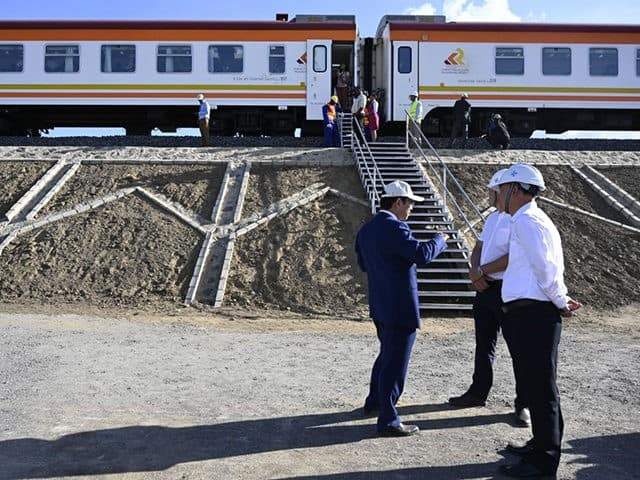Watchdog Warns: U.S. May Have to Pay African Debts to China in Coronavirus Collapse

The Chinese Communist Party (CCP), in the wake of the economic collapse triggered by the coronavirus pandemic, is ignoring debt relief calls by African countries targeted by Beijing’s predatory lending practices, a leader of a bipartisan American congressional commission suggested on Friday.
U.S. taxpayers may have to bail out the African countries unable to meet their financial obligations from Chinese “debt traps,” Carolyn Bartholomew, the chairwoman of the U.S.-China Economic and Security Review Commission established by Congress, declared in opening remarks prepared for a hearing Friday.
The coronavirus illness (COVID-19) originated in China where the CCP mismanaged its response and hid the severity of the lethal and highly contagious disease during its early stages, a move that slowed the globe’s response, U.S. officials believe.
American officials have also accused China of spreading disinformation that has contributed to the spread of the viral pandemic.
The United States has long accused China of using its Belt and Road Initiative (BRI) as a vehicle for predatory economic diplomacy to undermine the sovereignty of financially vulnerable African countries by burying them in unsustainable debts often collateralized with strategic assets and natural resources.
On Friday, the U.S.-China commission held a hearing on Beijing’s strategic aims in Africa, particularly the communist country’s growing influence on the continent and its implication for the United States.
In her written testimony, Bartholomew declared:
China’s funding [for Africa] comes at a price, contributing to an unsustainable buildup of debt in many African countries. These lending practices have led to accusations of a “new colonialism,” and in the wake of the economic slowdowns caused by the COVID-19 outbreak, African countries have increasingly called for debt relief. China has so far been silent to these requests, raising the question of whether the United States and other responsible donors will be left footing the bill. While China has publicized its humanitarian public health efforts in Africa during the COVID-19 pandemic, many Africans are skeptical, and have expressed concern that the equipment donated by China may be of poor quality.
American taxpayers are the dominant stakeholders of the International Monetary Fund (IMF) and the top contributors to the World Bank. Both organizations offer loans to developing countries. The United States is also the top source of funding for the United Nations. It also provides other forms of assistance through the U.S. Agency for International Development (USAID) and the Department of State, among other federal entities.
Nevertheless, China’s diplomatic attention and resources devoted to Africa exceed that of the United States, some witnesses noted during the hearing.
China is Africa’s largest trading partner, with the trade mainly concentrated on the continent’s oil- and mineral-rich countries.
In Africa, China is robbing “an emerging generation of young people of the birthright of their natural resources,” Christopher Maloney, the acting administrator for Africa at USAID, wrote in his testimony.
Amid the coronavirus pandemic, the Chinese communist party has also reportedly engaged in racist practices against foreigners of African descent accused of spreading the virus, allegedly including Americans.
U.S.-China commission chief Andreas Borgeas declared in his opening remarks:
The ongoing COVID-19 pandemic presents new challenges for China-Africa relations and may alter China’s relationships and image on the continent. In recent weeks, African leaders have spoken out against China in unusually frank terms for its reported mistreatment of Africans living in China, including actions forcing evictions of some Africans living in Chinese hotels and preventing Africans from entering restaurants and shops—actions ostensibly taken to stop the spread of the virus.African leaders have also called for Chinese debt relief in light of the global economic slowdown caused by COVID-19. China has reacted by stressing themes of Sino-African solidarity, and has used the pandemic as an opportunity to enhance its image through relief efforts and public diplomacy. The ultimate success of this campaign remains to be seen, but it is clear that China cannot afford to allow COVID-19 to damage the reputation it has spent so long building in Africa and risk jeopardizing its economic investments on the continent as a result.
“Coronavirus may slow down or even disrupt” China’s efforts to become a global power through growing military engagements in Africa and the BRI, former Amb. David Shinn, who is now an adjunct professor at George Washington University, noted in his written testimony.
In 2000, Congress reportedly established the U.S.-China body “to monitor, investigate, and submit to Congress an annual report on the national security implications of the bilateral trade and economic relationship between the United States and the People’s Republic of China” and provide recommendations for legislative action where appropriate.
Communist China is using its financial clout in Africa to promote its model of governance that promotes corruption, a lack of human rights, increased authoritarianism, and undercuts America’s pro-democracy efforts, some of the witnesses said, echoing other assessments.
Photo: SIMON MAINA/AFP via Getty Images




